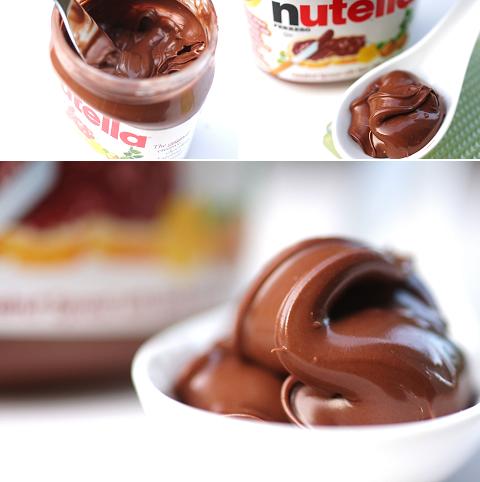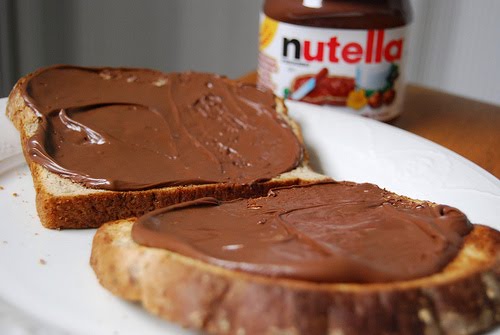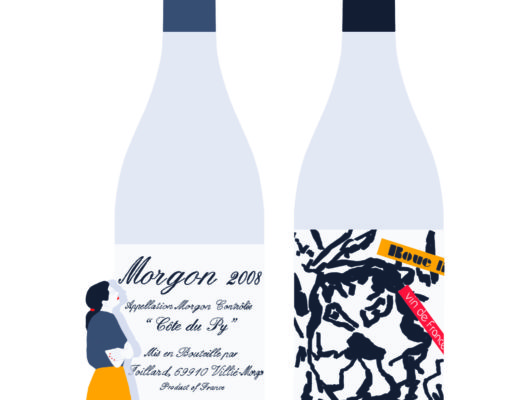Courtesy of one of my favorite food blogs, Ceramic Canvas
With all of the commentary about the French paradox –how they stay slim and fit while indulging fatty, traditional fare – what makes me laugh the most is the preposterous idea that Nutella somehow fits into a healthy, balanced breakfast. Commercials maintain that it is an excellent source of energy, what all kids (or adults, for that matter) need to start their day off right.
It should be said that Nutella’s first ingredient is sugar (all 11 grams in a 19 gram serving), so is there any doubt it will provide a burst of energy? Simple sugars are known to have this short term jolting effect, only to drop your blood sugar and subsequently your endurance and energy. Regardless of whether several scoops of Nutella are paired with a glass of milk, it by no means constitutes a healthy breakfast as claimed in the advertisements, especially given that the second ingredient after sugar is palm oil which is high in palmitic acid (linked to increased risk of cardiovascular disease). Where are all the hazelnuts they claim are so plentiful in every jar? Third on the list. Still, peanut-butter’s rival is a cultural icon not only in Italy but France as well, securing a place alongside the croissant as the preeminent snack.
“Spread on whole wheat bread, or any multi-grain product, with orange juice or skim milk is a good combination for a balanced breakfast [or snack] the whole family will enjoy”. Just as perplexing as my husband’s childhood snack of large chunks of baguette with squares of chocolate, not as a sort of sandwich, as I had envisioned, but eaten separately one after the other. Americans are hit over the head so often with healthy-eating messages (yet sneak cookies, chips and cakes from the cupboard) that the sheer concept of eating chocolate for breakfast or for a snack is completely bewildering.
Ever since I’ve lived in France, I’ve watched Nutella ads in bemusement wondering if people actually believe their claims. Don’t they realize they’re being duped by the big bad food industry into buying their sugary products and becoming addicted in the process? Millions of children all over Europe (and a few adults known to go at it by the spoonful) prove that the targeted corporate messages are being received loud and clear. So much so that its consumers are getting larger (from that and the prevalence of other unhealthy packaged good that have arrived into their diets) and becoming more at risk for the same diseases that have been plaguing the obese American population for years.
Chef for the French football team talking about how he is responsible for providing the players with complete and balanced meals that give them the energy they need to perform. What does that include for breakfast? You guessed it, Nutella. Clearly not the breakfast of champions (you know, because France lost.)
In an attempt to combat the growing rate of obesity, the European Parliament concluded that Nutella is too fattening and too sweet and must contain a “Dangerous Product” labelson its jars. Although ultimately rejected, a traffic light system of warnings was also proposed for food labels, arguing that the consumer has a right to be informed of the consequences of their food choices. If the measure is adopted by the Council of Europe, processed food brands whose products contain over 10g of sugar, 4g of fat and 2mg of salt (for 100g) – like Nutella – would no longer be allowed to advertise. What ever would we do without 30 seconds of joyful children skipping, playing and eating chocolate for breakfast (because their metabolisms allow them to)?
This news led to an aggressive backlash from the Vice President of Ferrero, Paolo Fulci, and Nutella lovers everywhere. In Northern Italy, a “Don’t Touch My Nutella!”support committee was formed as well as a Facebook group “Don’t Touch My Nutella: The Giant Virtual Snack”. Fulci argues that EU rules can not be allowed to “influence even the habits and the most intimate aspects of one’s personal sphere, like the genuine and healthy pleasures that are passed among generations”, implying that the government has no right to interfere with the food choices make in their own homes. Well, they can when you’re selling 235,000 TONS of what can be classified as a junk food product around which a “balanced diet” rhetoric has been created to encourage and/or reassure consumers.
French breakfast – add the croissant and it’s complete
Nutella may be delicious (it’s forbidden in our home), but their ads mislead the general public. It’s fair to assume that many consumers, like Americans, don’t have the financial means to invest money in healthier, more expensive goods, nor the educational level to fully understand the role that diet plays in overall health. If the foods available were healthier as a whole, education wouldn’t be much of an issue.
Nutella is for many Europeans what Eggos are to Americans. Both are mostly consumed for breakfast with deceptive messages leading us to believe they aren’t really THAT bad for our health. I’m not suggesting we should stop eating Nutella altogether- on the contrary, it’s excellent in desserts and should be consumed in moderation just like any other treat. As Fulci said, no one has ever died from Nutella. But it’s certainly hard to stop at just one scoop and therein lies the problem.












